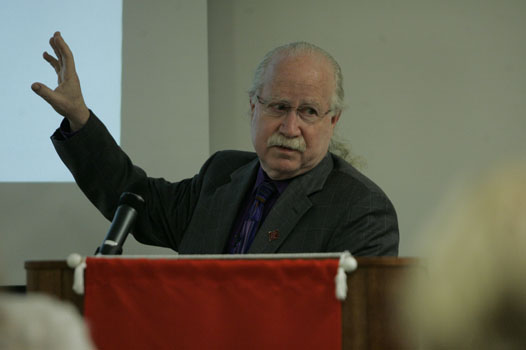“We’re all people. We’re all humans,” stated Dr. David A. Goldstein at a panel discussion on Nov. 8 inside the Bakersfield College Norman Levan Center.
The “physical scholar of medicine” was the main speaker in an in-depth discussion of health care policies and medical-ethics issues in society.
Goldstein’s lecture was composed of personal endeavors and the experiences he faced while working as chief of general internal medicine and vice-chair for clinical affairs at the Keck School of Medicine.
Goldstein’s speech addressed several ethical verities, such as non-malfeasance, distributive justice, and integrity, but focused mainly on the three models of distributive justice known as, equity, equality, and need.
“A good physician must be able to use the humanities to reflect on the horrors that we see, the tragedies we see, and the good things that we see,” said Goldstein.
“But it’s a very difficult job and I think I only appreciate how difficult it really is, as I’ve gotten older and older as I’ve worried about ‘rationing’ myself.
Its one of the reasons I write: so that I can reflect and read myself the stories of the lives that I intersect with.”
Along with key terms, Goldstein addressed criteria of expenses and money wasted caused by unnecessary greed and want.
“I can’t even listen to the radio or watch a TV show without hearing a commercial that’s advertising a certain medication,” said Goldstein.
Goldstein’s suggestion of a different rationing technique is to use generic medication instead of name-brand medicine to feed less into marketing.
Norman Levan and BC President Greg Chamberlain, along with numerous on and off students attended the seminar, some of which supported Goldstein’s ideas of health care reform.
BC and Cal State Bakersfield student, Nadia Salem, attended the event in hopes of supporting the issue of Healthcare Reform.
“I read on the BC Web site about Dr. Goldstein being on campus, and I knew I had to come,” said Salem.
“I always support any function that is for Health Care Reform and by being here I feel like I’m contributing.”
Goldstein discusses money spent on chemotherapy, dialysis procedures and the idea of existentialism.
“The challenge to us is to create a system where medical technology doesn’t help; where society can afford the expense of someone’s last six months,” he said.
Goldstein believes that it is possible to change the existing culture of waste and greed.
“There should be a rational approach to health care, not an approach to rationing,” Goldstein said.
“The idea of rationing health care unto the elderly and to those in need is currently a controversial topic under debate.”


